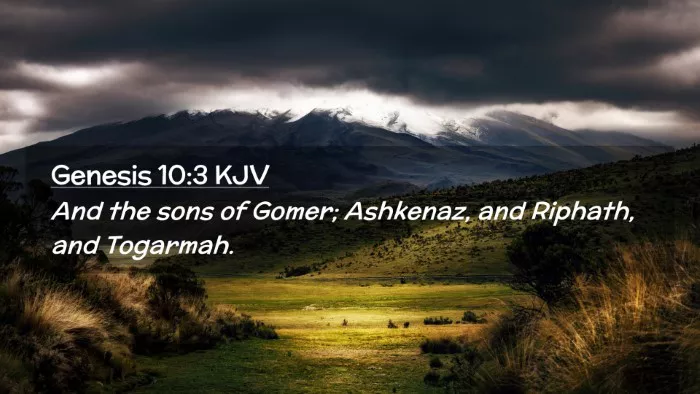Read the Daily Bible Verse Genesis 10:3 To Strengthen Your Spiritual Journey.
Genesis 10:3 is part of the genealogical account known as the “Table of Nations” in Genesis 10. This chapter traces the descendants of Noah’s sons—Shem, Ham, and Japheth—after the flood, showing how the nations of the world were repopulated. The verse specifically mentions the sons of Gomer, who was the eldest son of Japheth. Gomer’s descendants, Ashkenaz, Riphath, and Togarmah, are significant in ancient history and are linked to various regions and peoples in the world.
Ashkenaz is often associated with the Scythians and the regions around the Black Sea. Riphath is less clearly identified but is thought to be related to the Paphlagonians, an ancient people of Asia Minor. Togarmah is traditionally linked to the Armenians or to a people in the region of modern-day Turkey and the Caucasus.
Meaning of Genesis 10:3
The verse itself provides a brief record of the descendants of Gomer, emphasizing the spread of his lineage and its influence on various ancient civilizations. It reflects the broader theme of Genesis 10, which is to show the diversity and unity of humanity through the descendants of Noah. Each name mentioned—Ashkenaz, Riphath, and Togarmah—represents not only individuals but also the tribes and nations that arose from them.
This genealogical listing underscores the continuity of God’s creation and His plan for humanity. By tracing these lineages, the Bible connects different peoples to the original covenant made with Noah, highlighting the unity of mankind under God’s provision and judgment.
See also: What Does Genesis 10:1 Mean?
Application of Genesis 10:3 in Life
The genealogies in Genesis, including Genesis 10:3, might seem purely historical, but they carry significant spiritual and moral lessons. They remind us that God is concerned with the details of our lives, including our heritage and our connections to others. In a world often divided by race, ethnicity, and nationality, Genesis 10:3 calls us to recognize our common humanity and the fact that all people are part of God’s creation.
This verse also encourages us to reflect on our own legacy—what kind of influence we are passing on to future generations. Just as Gomer’s sons went on to establish significant nations, our actions and decisions have lasting impacts on those who come after us. This perspective urges us to live responsibly, recognizing that our lives are part of a broader narrative that God is unfolding.
Comparison with Other Biblical Texts
Genesis 10:3 can be compared with other genealogies in the Bible, such as those found in 1 Chronicles 1:6-7 and the genealogy of Jesus in Matthew 1. These genealogical records serve to connect historical events with God’s redemptive plan. In Matthew 1, the genealogy traces Jesus’ lineage, highlighting how God’s promises were fulfilled through the generations.
Another relevant text is Genesis 9:19, which states, “These are the three sons of Noah: and of them was the whole earth overspread.” This verse ties directly into Genesis 10, emphasizing that the entire human race descended from Noah’s three sons. It shows that despite the diversity of nations and cultures, humanity shares a common origin and is part of God’s creation.
Modern Relevance
In today’s world, where issues of identity, race, and nationalism often cause division, Genesis 10:3 reminds us of our shared heritage. The verse encourages us to look beyond superficial differences and recognize the fundamental unity of all people as part of God’s creation. This perspective can foster a spirit of inclusivity, compassion, and mutual respect, which are essential in our increasingly globalized society.
Moreover, understanding the historical and cultural connections in Genesis 10:3 can enrich our appreciation of how ancient civilizations influenced the development of modern nations. It invites us to explore our own roots and consider how our heritage shapes our identity and worldview today.
Conclusion
Genesis 10:3, though seemingly a simple genealogical record, carries deep theological and practical significance. It highlights the spread of humanity after the flood, the unity of the human race under God, and the importance of heritage and legacy. By studying this verse, we gain insight into the interconnectedness of all people and are reminded of our responsibility to live lives that honor God and contribute positively to the world around us.
As we reflect on Genesis 10:3, let us remember that our lives are part of a larger story that God is writing—a story that spans generations and connects us all in His divine plan.
Comments on Genesis 10:3
Historical Significance: “Genesis 10:3 provides key insights into the origins of various ancient civilizations. Understanding these connections helps us appreciate the historical depth of the Bible and its relevance to world history.”
Theological Reflection: “This verse reminds us of the unity and diversity of God’screation. Despite the differences among nations, we all trace our origins back to Noah and ultimately to Adam, emphasizing our common bond as God’s children.”
Cultural Impact: “The names Ashkenaz, Riphath, and Togarmah are not just historical figures; they represent the roots of entire cultures and peoples. Recognizing these connections enhances our understanding of how different cultures are interwoven in God’s plan.”
Spiritual Legacy: “Genesis 10:3 challenges us to consider the legacy we leave behind. Just as Gomer’s descendants established nations, our actions today will shape the future for generations to come.”

